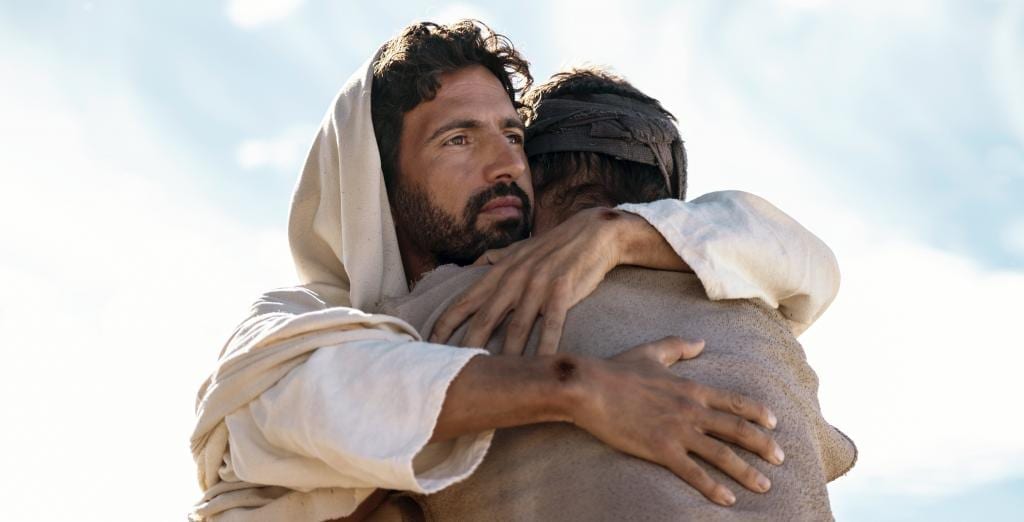If it’s Lent, it must be time for another docuseries about Jesus.
This year’s series is Jesus: His Life, a mix of dramatizations and talking-head interviews that devotes each episode to a different supporting character from the gospels. I have only seen two episodes so far — both of which air tonight on The History Channel — but the first is centred on Joseph, while the second is centred on John the Baptist, and future episodes will revolve around Mary, Peter, Judas Iscariot, Mary Magdalene, Caiaphas and Pontius Pilate, though probably not in that order. (Curiously, the series announces that it will tell the story of Jesus “through the eyes of those who knew him best,” but I’m not sure that that’s how I would describe the enemies of Jesus.)
As in other shows of this sort, there is a tension in this one between the scholarly desire to correct popular misconceptions about the historical record on the one hand, and a need to give the audience at least some of what it’s expecting on the other hand.
Some of the scholarly “corrections” are quite good. For example, one of the interviewees points out that the Greek word “tekton”, which is commonly translated “carpenter”, actually refers not just to people who work with wood but to construction workers of all sorts — so it is likely that Joseph and Jesus built houses and so on as well.
(The episode doesn’t get into this, but at least one scholar has also pointed out that, in a peasant culture of this sort, people who had to make a living this way may also have been from the lowest social classes, because they did not have any farmland of their own to work. So “tekton” may have been an insult, too: The only time Jesus is called one in the gospels is when his neighbours are blithely dismissing his ministry.)
Other scholarly soundbites push against the show’s dramatic grain by questioning the historicity of the gospels even as the dramatizations build on the gospels by adding their own fictitious elements. Thus, the episode on Joseph includes soundbites from scholars who doubt that the Nativity stories in Matthew and Luke really happened, but it also includes soundbites in which those same scholars speculate as to how Joseph “must have” felt when he learned that Mary was pregnant with Someone Else’s child — and while all this is going on, there are scenes in which an angry Joseph tells Mary he loved her “so much,” and he worries that he will not be able to love her son “like a real father.” (It bears mentioning that the gospels say nothing about Joseph’s age or his feelings for Mary, and that the oldest traditions tell us he was actually an older man — a widower, even — who agreed to marry Mary more to protect her than out of any romantic impulse.)
Similarly, those who are familiar with the stories of Jesus’ baptism might be frustrated by the seemingly arbitrary way the second episode picks and chooses which bits to dramatize. As per the historians, it dismisses Luke’s claim that Jesus and John were cousins, and it fleshes out the idea that John was a “mentor” to Jesus for some time before John baptized Jesus. But it still tries to retain the idea that there was something mystically significant about Jesus’ baptism — so the Baptist says Jesus saw something and didn’t tell him what it was. “What couldn’t I see?” he asks. But in John’s gospel, John the Baptist tells everyone that he did see the Spirit descend on Jesus like a dove.
If the series had simply presented scholars arguing over the finer points of the gospels, without all of the speculative psychologizing, that would have been one thing. If it had offered a simple dramatization of the Jesus story, then that would have been fine too (and it wouldn’t necessarily have mattered if it ignored or contradicted some of the details in the gospels, because the gospels don’t agree among themselves on every single detail either). But in its current format, the series presents some scholarly disagreements while maintaining some sort of unified narrative that ignores some aspects of the gospels, and the package as a whole isn’t entirely satisfying to me. It doesn’t cohere very well.
All that being said, the series does combine bits of the gospels in ways that shed new light on them, and will probably affect how I look at them for quite some time.
Most notably, the second episode links the Lord’s Prayer to the death of John the Baptist by having a grief-stricken Jesus teach his disciples the prayer pretty much right after he hears about John’s death. The gospels don’t link the Lord’s Prayer and the death of John that way: in Matthew’s gospel, Jesus teaches the Lord’s Prayer in chapter 6 (it’s part of the Sermon on the Mount) and John isn’t beheaded until chapter 14, while in Luke’s gospel, there is a passing reference to John’s death in chapter 9 and it isn’t until chapter 11 that Jesus’ followers ask him to teach them to pray the way that John taught his own disciples to pray. But Luke’s gospel does tell us that Jesus taught his disciples the Lord’s Prayer in imitation of John, on some level, and Matthew’s gospel strongly suggests that Jesus was emotionally affected by John’s death (“When Jesus heard what had happened, he withdrew by boat privately to a solitary place”), so linking the two passages like this does fit with what we know from the gospels — and it is precisely this sort of creative interpretation, which teases out the relationship between biblical characters in new and surprising ways, that I look for in films and TV shows on the life of Jesus.
Here’s hoping that future episodes will have similarly illuminating insights.
— Jesus: His Life will air two new episodes on The History Channel every Monday night between March 25 and April 15.














